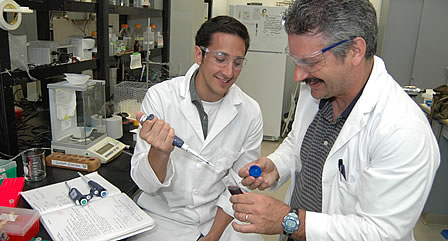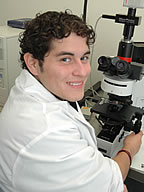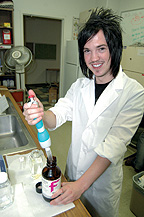Reaching for Research
MARC program showcases career opportunities.
September 8, 2006
by Pamela McLaren
Jose Corleto isn't quite sure how he made it to Cal State Fullerton. His mother, an immigrant from El Salvador, pushed him to succeed academically. To give him a better chance, she sent him to schools out of his South Central Los Angeles neighborhood, including a magnet high school with an emphasis on science.
Not sure what he was going to do, he applied to CSUF as an undeclared major thinking about the university's business administration program.
"Then I met a friend from high school who was majoring in biology to eventually become a dentist," Corleto remembers. The friend urged him to major in biological science, too — and he did, surprising himself that he did well and enjoyed it.
This summer, he spent his days in a laboratory trying to figure out how sperm is activated in sea squirts.
Through Cal State Fullerton's Minority Access to Research Careers (MARC) program, Corleto and five other college students are conducting science experiments and learning about the opportunities for a career in research.
Established more than a decade ago, MARC exposes undergraduate students to various types of research and the skills necessary to enter and succeed in graduate programs.
"The idea," says Amybeth Cohen, program director and associate professor of biological science, "is to give them the preparation to compete for slots at the top schools in the country."
The program is supported by grants from the National Institutes of Health. This year, it received $247,080 in funding.
Corleto and Jacob Gonzalez, a chemistry and biochemistry major, are the newest of the university's MARC scholars. Gonzalez is exploring the structure and function of the ADP enzyme under the direction of Christopher R. Meyer, professor of chemistry and biochemistry.
Gonzalez originally wanted to work as a pharmacist until an adviser recommended that he explore research as a possible career. Since he's been in the MARC program and working eight hours a day in the lab, "my big surprise is the time required," Gonzalez said. He recently purified his first protein, calling it a big accomplishment. "Dr. Meyer is awesome. It's been pretty exciting," he said.
Corleto is working with Robert A. Koch, chair and professor of biological science. He applied to the MARC program following a prod by a teaching associate who "lit a fire." The faculty mentors, he said "push you, but they also are nurturing. It's a good opportunity for hands-on research."
When he began, Corleto "expected to run the experiment and it would work, but sometimes you have to run the experiment several times and it may work only once. You learn lots of patience in the lab."
Program participants are required to complete specific science courses, conduct an average of 15 hours of research per week during both semesters of the academic year plus full time for eight weeks in the summer, conduct a specific research project that will culminate in a senior thesis, and defend their findings before a thesis committee at the end of the program.
MARC scholars attend a weekly seminar where they read scientific papers, learn how to develop research presentations and hear from guest speakers they invite to the sessions. They also are expected to attend and deliver presentations at local and national professional meetings.
Last spring, the scholars heard a presentation from a Johns Hopkins University engineering professor, who discussed prosthetics and the process of designing them so that they function similarly to the human limb, Cohen said. They've also heard lectures from plant biologists from the University of Massachusetts, as well as about evolution and how humans make choices from UCLA cultural anthropologists. It's all part of the research experience, noted Cohen, and helps the scholars see the opportunities to continue studies beyond their undergraduate efforts.
Gonzalez and Corleto join four continuing MARC scholars: electrical engineering major Anita Nosratieh, who spent her summer conducting research under the direction of Nancy Albritton, a faculty member at UCI; Eric Nunes, a senior psychology major studying with Jennifer Trevitt-Carlson, assistant professor of psychology; Richard Parenteau, a biological science senior who spent the summer conducting research at UC San Francisco; and Kevin Chavarria, a psychology major who recently was working at the Institute of Psychiatry at King's College in England.
"Conducting research [at King's College] allows me … to gain perspective by working with Ph.D. students and other professionals so that I know what to expect in the future," said Charvarria, whose summer research delved into structural analysis of the brains of twins with bipolar disorder.
"The first year [in the MARC program] allowed me to gain first-hand research experience that I might not have been able to get without the program," said Chavarria, whose CSUF mentor was Nancy Segal, professor of psychology and a noted twins researcher.
"Being able to present my research in a professional setting has been a great experience as well."
MARC scholars Paul Gerard and Diego Miranda recently completed the program and their degrees from CSUF. Gerard is now enrolled in a postbaccalaureate program at UCI and Miranda has been accepted to Albert Einstein College of Medicine of Yeshiva University in New York.
"It's a lot of hard work," said Cohen, who has mentored five previous scholars. "We expect a lot of them, but if they rise to the challenge, they do well."
One of Cohen's former MARC scholars is Laura Arce (B.A. biological science '00), who is completing her doctorate at UCI this fall. The program, she said, "put me ahead of the curve in all aspects of being a scientist. In addition to challenging me academically, it also pressed me to be proficient in my presentation and scientific writing skills, and most importantly, my ability to think as a scientist.
"MARC prepared me for graduate school and the National Institutes of Health program continues to fund my academic career," Arce said, noting that she is a MARC graduate fellow. "In the future, I hope to procure an academic position in science at a local college or university where I can both influence students and pursue biomedical research that contributes to society's health and well being. I owe my current and future success to my former and current mentors and hope to continue the cycle with my work."
Since 1995, 27 students have completed the two-year program and gone on to doctoral and master's degree programs at such institutions of higher education as UC Irvine, UC San Diego and USC.




 Produced by the Office of Public Affairs at California State University, Fullerton.
Produced by the Office of Public Affairs at California State University, Fullerton.